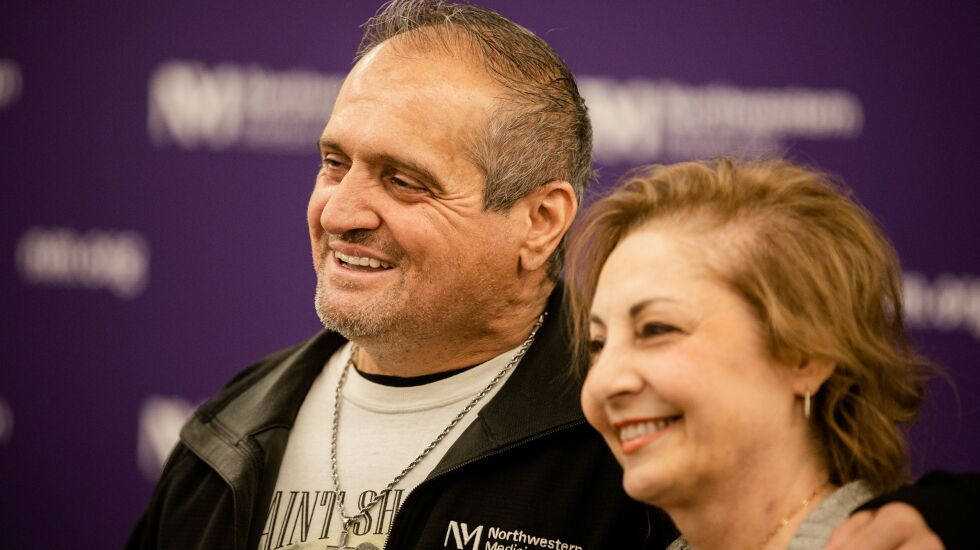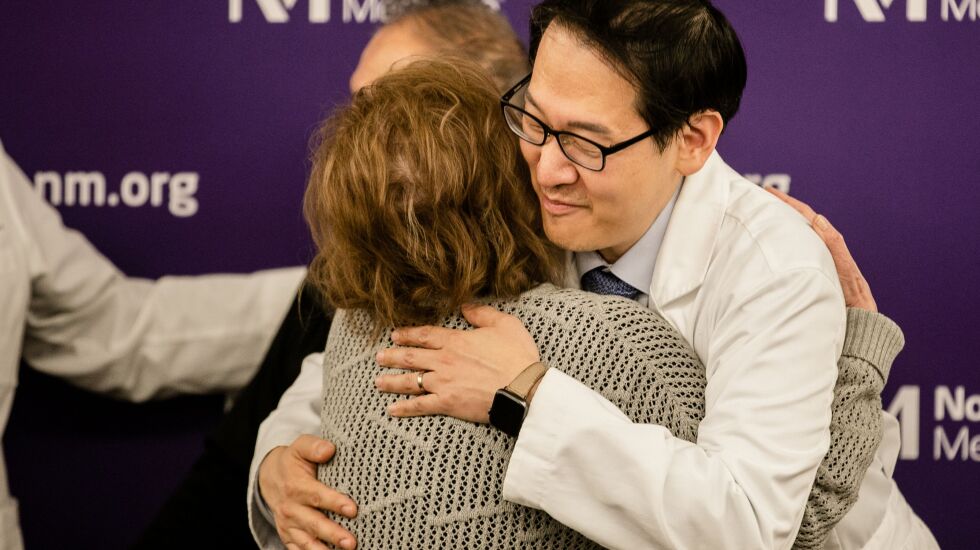
Resigned to hospice care with stage 4 lung cancer, Tannaz Ameli was given a second chance at life last year.
“I begged my doctors in Minnesota to consider a lung transplant but they wouldn’t do it,” said Ameli, 64, a retired nurse from Minneapolis, Minn. “Luckily, my husband refused to give up and pushed for a second opinion.”
He got one from Dr. Ankit Bharat and other physicians at Northwestern Memorial Hospital, who determined that Amerli qualified for a double transplant under a new program being started there.
“The first thing Dr. Bharat told me was, ‘I think we can make you cancer-free,’ and he delivered on those words,” Ameli said.
Northwestern said it had similar success on another patient with stage 4 lung cancer, Albert Khoury, 54, of Chicago. Like Ameli, Khoury’s cancer was confined to the lungs and hadn’t spread to other parts of his body.
“My life went from zero to 100,” Khoury said. “You didn’t see this smile on my face for over a year, but now I can’t stop smiling.”
Northwestern said Khoury and Ameli didn’t require any further cancer therapy after transplants.

Encouraged by the results, Northwestern Medicine said Wednesday it is launching a first-of-its-kind clinical trial called DREAM, for double lung replacement and multidisciplinary care. The hospital said the trial is aimed at some of the most “hopeless patients” who are “out of treatment options and have limited time to live.”
While lung transplants are an accepted form of treatment for certain forms of lung cancer, health care experts shy away from the complicated procedure because of the likelihood that the cancer will recur, according to Bharat, chief of thoracic surgery and director of Northwestern Medicine’s Canning Thoracic Institute.
Using a novel surgical method to clear cancer cells from the lungs of stage 4 lung cancer patients, “we believe this technique can help reduce the risk of recurrence,” Bharat said.
Northwestern doctors remove both cancer-ridden lungs along with lymph nodes, then check the airways and chest cavity for any cancer cells before transplanting new lungs.
“These patients can have billions of cancer cells in the lungs, so we must be extremely meticulous to not let a single cell spill into the patient’s chest cavity or blood stream,” Bharat said.
In the case of Ameli, she said she made several visits to a doctor in September of 2021 after struggling with a persistent cough that kept getting worse. Despite rounds of CT scans and chest x-rays, doctors continued to diagnose her with pneumonia.
Four months later, Ameli went to a large health system in Minnesota where they confirmed she had stage 4 lung cancer. Doctors told her chemotherapy wouldn’t be enough to save her life.
Pleading for a lung transplant, doctors instead recommended hospice care. On July 3 last year, Northwestern Medicine listed Ameli for a double-lung transplant. Just 10 days later, the hospital found a match and she underwent the successful surgery.
“Life has a different meaning now. [I] didn’t appreciate life before,” Ameli said Wednesday. “Living in Minnesota with a lot of snow and cold weather all the time, now I look at the snow and I go like, ‘Oh, it’s so beautiful.’ ”
Khoury was the first patient with stage 4 lung cancer to receive a double lung transplant at Northwestern, on Sept. 25, 2021.
He initially thought his lingering cough was COVID and was later told it was lung cancer.
“Before Khoury, no lung transplants had been performed on lung cancer patients at Northwestern Medicine,” the hospital said in a statement. “But Khoury’s health continued to decline, and he ended up in the intensive care unit on a ventilator with pneumonia and sepsis.”
As hospice care was being considered for Khoury, Northwestern Medicine surgeons decided to operate because his tumor was localized to the chest. Eighteen months after receiving the surgery, Khoury still has no signs of cancer in his body and has returned to work, the hospital said.
With his second chance, Khoury said he plans to travel as soon as he can and enjoy life to the fullest.
“The first day I went to work, oh my God, I was so happy. I was like, I’m back. I did it. I made it,” he said. “Everything is beautiful. I just want to hug people.”
The goal moving forward is to create a new research registry, where the program’s first 75 patients will be tracked and monitored. Patients interested in being evaluated for the program can contact the referral line at 844-639-5864.







